ASUS DSL-N10 User Manual
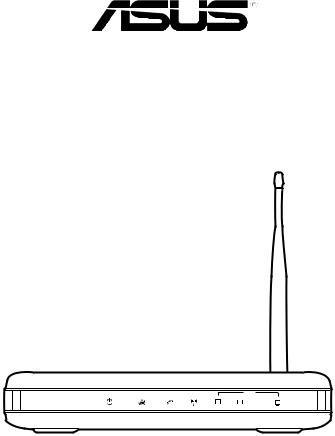
DSL-N10
11N Wireless ADSL Modem Router
DSL-N10 |
Power |
ADSL |
Internet Wireless |
1 |
2 |
LAN |
4 |
3 |
11N Wireless ADSL Modem Router
User Manual

E6067
First Edition
October 2010
Copyright © 2010 ASUSTeK Computer Inc. All Rights Reserved.
No part of this manual, including the products and software described in it, may be reproduced, transmitted, transcribed, stored in a retrieval system, or translated into any language in any form or by any means, except documentation kept by the purchaser for backup purposes, without the express written permission of ASUSTeK Computer Inc. (“ASUS”).
Product warranty or service will not be extended if: (1) the product is repaired, modified or altered, unless such repair, modification of alteration is authorized in writing by ASUS; or (2) the serial number of the product is defaced or missing.
ASUS PROVIDES THIS MANUAL “AS IS” WITHOUT WARRANTY OF ANY KIND, EITHER EXPRESS OR IMPLIED, INCLUDING BUT NOT LIMITED TO THE IMPLIED WARRANTIES OR CONDITIONS OF MERCHANTABILITY OR FITNESS FOR A PARTICULAR PURPOSE. IN NO EVENT SHALL ASUS, ITS DIRECTORS, OFFICERS, EMPLOYEES OR AGENTS BE LIABLE FOR ANY INDIRECT, SPECIAL, INCIDENTAL, OR CONSEQUENTIAL DAMAGES (INCLUDING DAMAGES FOR LOSS OF PROFITS, LOSS OF BUSINESS, LOSS OF USE OR DATA, INTERRUPTION OF BUSINESS AND THE LIKE), EVEN IF ASUS HAS BEEN ADVISED OF THE POSSIBILITY OF SUCH DAMAGES ARISING FROM ANY DEFECT OR ERROR IN THIS MANUAL OR PRODUCT.
SPECIFICATIONS AND INFORMATION CONTAINED IN THIS MANUAL ARE FURNISHED FOR INFORMATIONAL USE ONLY, AND ARE SUBJECT TO CHANGE AT ANY TIME WITHOUT NOTICE, AND SHOULD NOT BE CONSTRUED AS A COMMITMENT BY ASUS. ASUS ASSUMES NO RESPONSIBILITY OR LIABILITY FOR ANY ERRORS OR INACCURACIES THAT MAY APPEAR IN THIS MANUAL, INCLUDING THE PRODUCTS AND SOFTWARE DESCRIBED IN IT.
Products and corporate names appearing in this manual may or may not be registered trademarks or copyrights of their respective companies, and are used only for identification or explanation and to the owners’ benefit, without intent to infringe.
Offer to Provide Source Code of Certain Software
This product contains copyrighted software that is licensed under the General Public License (“GPL”), under the Lesser General Public License Version (“LGPL”) and/or other Free Open Source Software Licenses. Such software in this product is distributed without any warranty to the extent permitted by the applicable law. Copies of these licenses are included in this product.
Where the applicable license entitles you to the source code of such software and/or other additional data, such data should have been shipped along with this product.
You may also download it for free from http://support.asus.com/download.
The source code is distributed WITHOUT ANY WARRANTY and licensed under the same license as the corresponding binary/object code.
ASUSTeK is eager to duly provide complete source code as required under various Free Open Source Software licenses. If however you encounter any problems in obtaining the full corresponding source code we would be much obliged if you give us a notification to the email address gpl@asus.com, stating the product and describing the problem (please do NOT send large attachments such as source code archives etc to this email address).

Table of contents |
|
About this guide..................................................................................... |
4 |
Chapter 1: Knowing your wireless router |
|
Package contents................................................................................... |
6 |
System requirements............................................................................. |
6 |
Before you proceed................................................................................ |
6 |
Rear panel......................................................................................... |
8 |
Bottom panel...................................................................................... |
9 |
Mounting options................................................................................. |
10 |
Chapter 2: Getting started |
|
Setting up the wireless router.............................................................. |
11 |
Using the Quick Internet Setup (QIS).................................................. |
11 |
Setting up the wireless ADSL router................................................ |
12 |
Chapter 3: Configuring the network clients |
|
Accessing the wireless router............................................................ |
16 |
Setting an IP address for wired or wireless clients.......................... |
16 |
Chapter 4: Configuring via the web GUI |
|
Configuring via the web GUI............................................................... |
20 |
Using the Network Map........................................................................ |
21 |
Creating multiple SSID profiles........................................................ |
22 |
Managing bandwidth with EzQoS....................................................... |
23 |
Upgrading the firmware....................................................................... |
24 |
Restoring/Saving/Uploading settings................................................ |
25 |
Chapter 5: Installing the utilities |
|
Installing the utilities............................................................................ |
26 |
Device Discovery.................................................................................. |
28 |
Firmware Restoration.......................................................................... |
29 |
ADSL Setting Wizard............................................................................ |
30 |
Using ADSL Setting Wizard............................................................. |
30 |

Table of contents |
|
Chapter 6: Troubleshooting |
|
Troubleshooting................................................................................... |
37 |
ASUS DDNS Service............................................................................ |
40 |
Frequently Asked Questions (FAQs)............................................... |
40 |
Appendices |
|
Declaration of Conformity for R&TTE directive 1999/5/EC.............. |
42 |
CE Mark Warning............................................................................. |
42 |
GNU General Public License........................................................... |
42 |
REACH 48 |
|
Safety Warning................................................................................ |
48 |
ASUS Contact Information.................................................................. |
49 |
Networks Global Hotline Information................................................. |
50 |
About this guide
This user guide contains information that you need to install and configure the
ASUS Wireless ADSL Router.
How this guide is organized
This guide contains the following parts:
•Chapter 1: Knowing your wireless router
This chapter provides information on the package contents, system requirements, hardware features, and LED indicators of the ASUS Wireless ADSL Router.
•Chapter 2: Getting started
This chapter provides instructions on setting up the Router and Access Point modes of the ASUS Wireless ADSL Router.
•Chapter 3: Configuring the network clients
This chapter provides instructions on setting up the clients in your network to work with your ASUS Wireless ADSL Router.

•Chapter 4: Configuring via the web GUI
This chapter provides instructions on configuring the ASUS Wireless ADSL
Router using its web Graphical User Interface (web GUI).
•Chapter 5: Installing the utilities
This chapter provides information on the utilities that are available from the support CD.
•Chapter 6: Troubleshooting
This chapter provides you with a troubleshooting guide for solving common problems you may encounter when using the ASUS Wireless ADSL Router.
•Appendices
This chapter provides you with the regulatory Notices and Safety Statements.
Conventions used in this guide
WARNING: Information to prevent injury to yourself when trying to complete a task.
CAUTION: Information to prevent damage to the components when trying to complete a task.
IMPORTANT: Instructions that you MUST follow to complete a task.
NOTE: Tips and additional information to aid in completing a task.

Knowing 1your wireless ADSL router
Package contents
Check the following items in your ASUS Wireless ADSL Router package.
DSL-N10 Wireless ADSL Router x1 5dBi detachable antenna x1 Power adapter x1
Support CD (manual, utilities) x1 RJ-45 cable x1
RJ-11 cable x1 Quick Start Guide x1
ADSL connection setting table x1 Warranty card x1
Note: If any of the items is damaged or missing, contact your retailer.
System requirements
Before installing the ASUS Wireless ADSL Router, ensure that your system/ network meets the following requirements:
•An Ethernet RJ-45 port (10Base-T/100Base-TX), or
at least one IEEE 802.11b/g/n device with wireless capability
•An installed TCP/IP and Internet browser
Before you proceed
Take note of the following guidelines before installing the ASUS Wireless ADSL Router:
•The length of the Ethernet cable that connects the device to the network (hub, ADSL/cable modem, router, wall patch) must not exceed 100 meters.
•Place the device on a flat and stable surface as far from the ground as possible.
•Keep the device clear from metal obstructions and away from direct sunlight.
DSL-N10 |
Chapter 1: Knowing your wireless router |
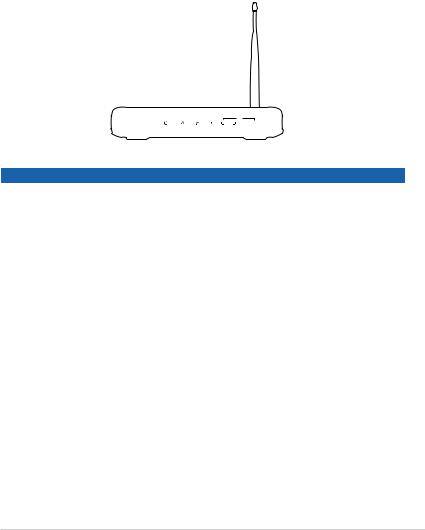
•Keep the device away from transformers, heavy-duty motors, fluorescent lights, microwave ovens, refrigerators, and other industrial equipment to prevent signal loss.
•Install the device in a central area to provide ideal coverage for all wireless mobile devices.
•Install the device at least 20cm from a person to ensure that the product is operated in accordance with the RF Guidelines for Human Exposure adopted by the Federal Communications Commission.
Hardware features
Front panel
|
|
|
|
|
DSL-N10 |
Power ADSL Internet |
Wireless |
LAN |
|
|
|
||||
|
|
|
|
|
1 2 3 4 |
|
|
|
|
||||||
|
|
|
|
|
11N Wireless ADSL Modem Router |
|
|
|
|
|
|
|
|
|
|
|
|
|
|
|
|
|
|
|
|
|
|
|
|
|
|
|
|
|
|
|
|
|
|
|
|
|
|
|
|
|
|
|
|
|
|
|
|
|
|
|
|
|
|
|
|
|
|
Status indicators |
|
|
|
|
|
|
|
|
|
||||||
|
|
|
|
|
|
|
|
|
|
|
|
|
|
|
|
LED |
Status |
|
|
Indication |
|||||||||||
|
Solid light |
|
|
Power on |
|||||||||||
|
Flashing fast (once per |
|
Reset mode |
||||||||||||
Power |
second) |
|
|
|
|
|
|
|
|
|
|||||
Flashing very fast (five times |
|
Launching WPS function |
|||||||||||||
|
per second) |
|
|
|
|
|
|
|
|
|
|||||
|
Normal flashing |
|
|
Rescue mode |
|||||||||||
|
Off |
|
|
Power off / Failure |
|||||||||||
ADSL |
Solid light |
|
|
ADSL link is established. |
|||||||||||
Flashing |
|
|
No ADSL link, or unable to establish |
||||||||||||
|
|
|
|
|
|
|
|
|
ADSL link |
||||||
Internet |
Solid light |
|
|
Internet connection is established. |
|||||||||||
Flashing |
|
|
Transmitting or receiving data |
||||||||||||
|
Off |
|
|
Internet connection is failed. |
|||||||||||
Wireless |
Solid light |
|
|
Wireless is enabled. |
|||||||||||
Flashing |
|
|
Establishing WLAN connection |
||||||||||||
|
Off |
|
|
No wireless connection |
|||||||||||
|
Solid light |
|
|
Has physical connection to an Ethernet |
|||||||||||
LAN1~LAN4 |
|
|
|
|
|
|
|
|
network |
||||||
Flashing |
|
|
Transmitting or receiving data (through |
||||||||||||
|
|
|
|
|
|
|
|
|
Ethernet cable) |
||||||
|
Off |
|
|
No power or no physical connection |
|||||||||||
Chapter 1: Knowing your wireless router |
DSL-N10 |
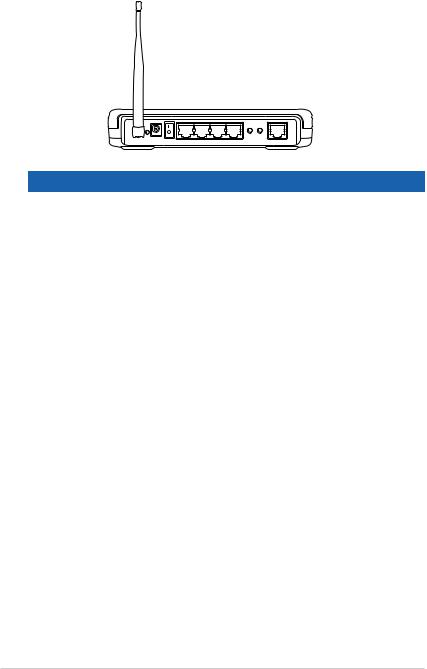
Rear panel
ANT Reset Power |
|
|
|
|
|
Wireless |
|
On/Off |
LAN4 |
LAN3 |
LAN2 |
LAN1 |
WPS On/Off |
ADSL |
Label |
Description |
Reset |
Press this button for more than five seconds to reset the |
|
system to its factory default settings. If this function failed, |
|
refer to section Firmware Restoration on page 29 for |
|
details on how to restore your router to default settings. |
Power |
Insert the AC adapter into this port to connect your router |
|
to a power source. |
On/Off |
Press this button to turn the power on/off. |
LAN1-LAN4 |
Connect RJ-45 Ethernet cables to these ports to establish |
|
LAN connection. |
WPS |
Press this button to launch WPS function. |
Wireless On/Off |
Press this button to enable or disable wireless function. |
ADSL |
Connect to a splitter or to a telephone outlet via an RJ-11 |
|
cable. |
DSL-N10 |
Chapter 1: Knowing your wireless router |
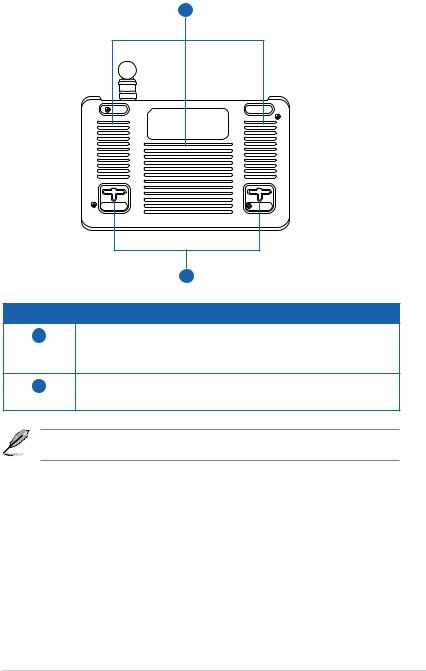
Bottom panel
2
1
Item |
Description |
1Mounting hooks
Use the mounting hooks to mount your router on concrete or wooden surfaces using two round head screws.
2Air vents
These vents provide ventilation to your router.
Note: For details on mounting your router on a wall or ceiling, refer to the section Mounting options on the next page of this user manual.
Chapter 2: Setting up the hardware |
DSL-N10 |
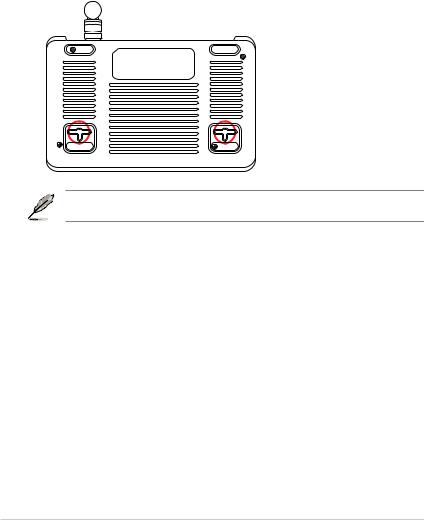
Mounting options
Out of the box, the ASUS Wireless ADSL Router is designed to sit on a raised flat surface like a file cabinet or book shelf. The unit may also be converted for mounting to a wall or ceiling.
To mount the ASUS Wireless ADSL Router:
1.Look on the underside for the two mounting hooks.
2.Mark two upper holes in a flat surface.
3.Tighten two screws until only 1/4'' is showing.
4.Latch the hooks of the ASUS Wireless ADSL Router onto the screws.
Note: Re-adjust the screws if you cannot latch the ASUS Wireless ADSL Router onto the screws or if it is too loose.
10 |
DSL-N10 |
Chapter 2: Setting up the hardware |
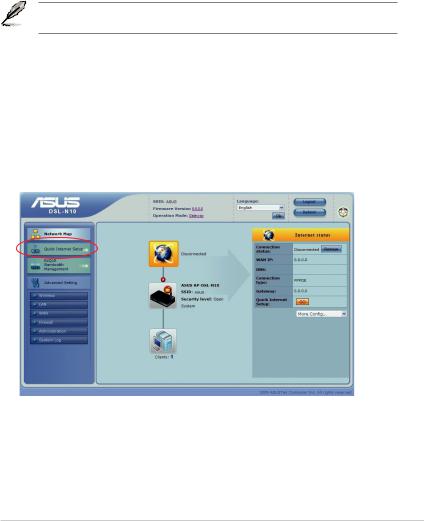
Getting started2
Setting up the wireless router
The ASUS Wireless ADSL Router includes a web Graphical User Interface (web
GUI) that allows you to configure the wireless ADSL router using your web browser on your computer.
Note: For details on configuring your wireless router using the web GUI, refer to Chapter 4:
Configuring via the web GUI.
Using the Quick Internet Setup (QIS)
The Quick Internet Setup (QIS) function, which is integrated in the wireless ADSL router’s web GUI, detects the Internet connection type (VPI/VCI value, ADSL connection type, and Encapsulation mode) automatically and guides you in setting up your network quickly.
The QIS web page appears automatically after you connected all your devices and launched your web browser. You may also launch the QIS from the Network Map page in the web GUI. To do this, click Quick Internet Setup on the left column.
Chapter 2: Setting up the hardware |
DSL-N10 |
11 |
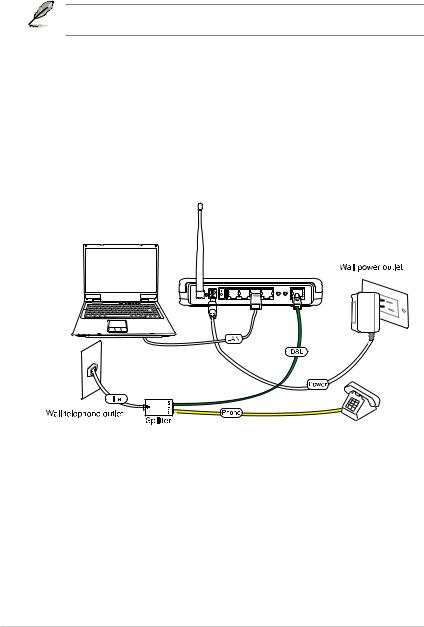
Setting up the wireless ADSL router
The ASUS wireless ADSL router meets various working scenarios with proper configurations. You may need to change the wireless router’s default settings so as to meet the requirements in your wireless environment.
Notes: We recommend that you use wired connection for initial configuration to avoid possible setup problems due to wireless uncertainty.
To set up the wireless ADSL router:
1.Connect your devices.
To set up via wired connection
a.Insert the splitter's line connector to the phone outlet and connect your phone into the phone port (A).
b.Connect your wireless router's ADSL port to the splitter’s DSL port (B).
c.Using the bundled RJ-45 LAN cable, connect your computer to the wireless router's LAN port (C).
ASUS Wireless ADSL Router
ANT Reset Power |
|
|
|
|
Wireless |
|
Power |
LAN4 |
LAN3 |
LAN1 |
WPS On/Off |
ADSL |
(C) (B)
(A)
12 |
DSL-N10 |
Chapter 2: Setting up the hardware |
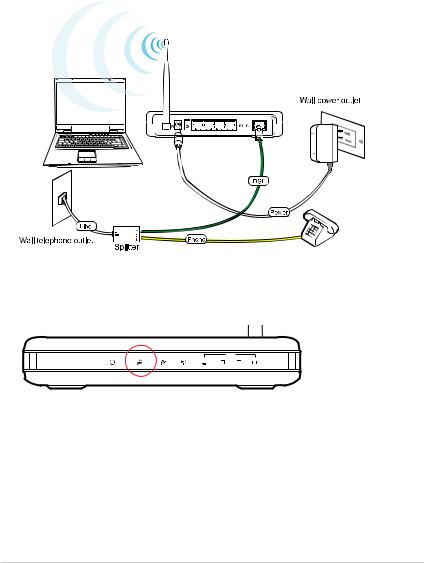
To set up via wireless connection:
a.Insert the splitter's line connector to the phone outlet and connect your phone into the phone port (A).
b.Connect your wireless router's ADSL port to the splitter’s DSL port (B).
c.Turn on your computer and double-click the wireless network icon on the Windows® task bar to view available networks. Select your wireless router. By default, there is no security key for the wireless router. Click Connect and the connection is completed within seconds.
ASUS Wireless ADSL Router
|
|
|
ANT Reset Power |
|
|
|
|
|
Wireless |
ADSL |
|
|
|
Power |
LAN4 |
LAN3 |
LAN2 |
LAN1 |
WPS On/Off |
||
|
|
|
|
|
|
|
|
|
|
|
|
|
|
|
|
|
|
|
|
|
|
(B)
(A)
2.Before starting ADSL setting procedure, ensure that the ADSL indicator on DSL-N10 front panel become solid.
DSL-N10 |
Power |
ADSL |
Internet Wireless |
1 |
2 |
LAN |
4 |
3 |
11N Wireless ADSL Modem Router
Chapter 2: Setting up the hardware |
DSL-N10 |
13 |
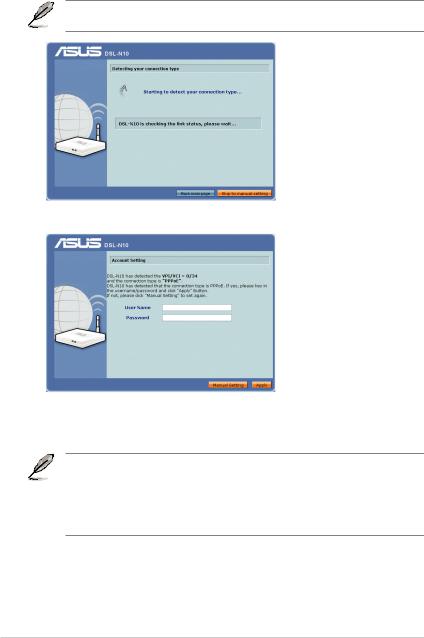
3.Launch your web browser. The QIS web page appears automatically and starts detecting your connection type, VPI/VCI value and encapsulation mode.
Note: If the QIS web page does not appear after you launched your web browser, disable the proxy settings on your web browser.
4. Key in the user name and password. Click Apply.
If the QIS cannot detect your Internet connection type, click Manual Setting and set up the Internet connection manually.
Note:
•The PPPoE Internet connection type is used in this setup case. The setup screen varies with different Internet connection types.
•Obtain the required information such as the user name and password from your Internet Service Provider (ISP).
14 |
DSL-N10 |
Chapter 2: Setting up the hardware |

5. The Internet connection setup is completed.
•Click Going to Internet to surf the Internet.
•Click Simply Wireless Security Setting to configure the basic security settings including the SSID, authentication, and encryption methods for the wireless router.
•Click Advanced Setting page to manually configure advanced settings for the wireless router.
•Click Add to Favorites to add this URL to your Favorites list for quick access to the web GUI.
Chapter 2: Setting up the hardware |
DSL-N10 |
15 |

Configuring3the
network clients
Accessing the wireless ADSL router
Setting an IP address for wired or wireless clients
To access the ASUS Wireless ADSL Router, you must have the correct TCP/IP settings on your wired or wireless clients. Ensure that the clients’ IP addresses are within the same subnet as the ASUS Wireless ADSL Router.
By default, the ASUS Wireless ADSL Router integrates the DHCP server function, which automatically assigns IP addresses to the clients in your network.
But in some instances, you may want to manually assign static IP addresses on some of the clients or computers in your network rather than automatically getting IP addresses from your wireless router.
Follow the instructions below that correspond to the operating system installed on your client or computer.
Note: In the Router mode, if you want to manually assign an IP address to your client, we recommend that you use the following settings:
•IP address: 192.168.1.xxx (xxx can be any number between 2 and 254. Ensure that the IP address is not used by another device)
•Subnet Mask: 255.255.255.0 (same as the ASUS Wireless ADSL Router)
•Gateway: 192.168.1.1 (IP address of the ASUS Wireless ADSL Router)
•DNS: 192.168.1.1 (ASUS Wireless ADSL Router) or assign a known DNS server in your network
16 |
DSL-N10 |
Chapter 3: Configuring the clients |
